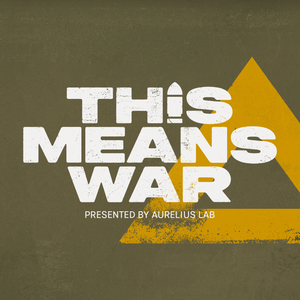
This Means War
Peter Roberts
- 32 minutes 43 secondsSDR Threat series – Buying Silver Bullets
The continual changes to British defence acquisition and procurement processes, frameworks, doctrines, strategies and plans have wreaked havoc with the military equipment plan for decades. Various – and sometimes radical – reforms have been tried to evolve a system that is ubiquitously criticised from everyone inside (and outside) the national security community. No one is happy, yet most people actually involved in it are trying very hard to make it work. This is not a uniquely British problem however: There is nowhere in the world that people are content with their procurement system - each one could be faster, buy better kit, deliver imporved value-for-money and quality, pleasing taxpayers as well as the people who use the kit. Given that the on-going UK SDR must try and come up with some recommendations to make it ‘better’ (hopefully in a different way than every other one has promised to do since 1997), what are the opportunities and risks this time around? Dr Andrew Curtis helps us think thus through with some sage advice: how about starting by implementing all the bits of some previous attempts at reform?
27 December 2024, 8:28 am - 43 minutes 51 secondsSDR Threat series - Missile Defence (you can't defend everything)
Successive reports from the UK parliament since 2022 have highlight the inadequacies of air and missile defences in the UK against a growing threat envelope. Like many European states, missile defence – from UAVs, conventional, ballistic or hypersonic missiles – has been an area that successive governments have underinvested in. Events in Ukraine, Syria, Yemen and Israel make those points with rather startling clarity. Part of the remit that the UK SDR has been charged with is a ‘so what’ moment on missile defence. What would good look like? What would it cost? Are we (in the UK and other European states) starting from scratch or is there an existing baseline to build on? One of the global IAMD experts and gurus in such matters is Tom Karako from CSIS in Washington DC. His pragmatism on what can be delivered, what must be defended against, and success looks like is noteworthy. As a finale, Tom offers some metrics of success of any UK announcement of a missile defence capability for the UK that is announced over the coming year.
18 December 2024, 2:51 pm - 34 minutes 52 secondsThe Threat Landscape with Peter Frankopan
National security risk registers capture a large number of potential threats to societies. So should any review of national security or national defence. The impacts of these risks are often more severe than predicted, and we are due a few more (according to pattern analysis over the history of the planet). Professor Peter Frankopan, global best-selling author and world renowned historian, talks through some of the big issues that should be on the agenda of any threat-based national security review including food, health, fuel, water, and raw materials.
The UK has a sound record of identifying these threats - even if successsive governments are poor at preparing for them. It is somewhat puzzling that any review of national security, like the one that the UK is currently undertaking, should be focused solely on military, geopolitical and technology risks and not those that might prove a much greater challenge to the safety and security of the state.
11 December 2024, 6:06 am - 34 minutes 36 secondsSDR Threat Series: Misunderstanding Adversaries and Inconvenient Threats
National security is an all-encompassing, cross-society endeavour: Any national security strategy must be that too, or it will miss critical elements and levers. In conversation with Maria de Goeij Reid from the Changing Character of War programme at Oxford University, the often-ignored aspects of resilience and economics within SDRs is brought starkly to the fore. By relying on convenient threats (ie those that have a military and foreign policy solution), policymakers, military and political leaders return to their comfortable intellectual spaces of known-knowns and simply reprioritise some policy and military capability: the result is a series of surprises (that have previously been predicted by other arms of government), for which the state is ill-prepared or not equipped to respond to. At the heart of all this lies an inability to understand adversaries, or our own decision-making. Maria makes a compelling case for putting more emphasis on strategic empathy using the lessons from advances in complexity economics.
4 December 2024, 6:06 am - 39 minutes 58 secondsSDR Threat Series: Weapons, Systems, and the promise of AI
Professor Tony King (author of “Command”, “Urban Warfare”, and “The Combat Soldier”) talks through his understanding of how threats will develop over the coming years, not least of which will be another Trump presidency in the USA. Using Great Power Competition as a guide, Tony talks about warfare regimes that will accompany the proliferation of state sponsored proxies, about where national security challenges will emerge, and the inability of tradiotnal (declining?) powers to deal with them alone. New weapons, the importance of systems, and the complexity of decision-making all feature in an episode that culminates in a discussion on AI and War; the topic of Tony’s recent research and his forthcoming book. His conclusions: we need to be more sceptical about what AI will deliver in terms of ‘savings’.
This mini-series is sponsored by Raytheon UK.
12 November 2024, 7:07 am - 39 minutes 49 secondsSDR Threats Series: Styles and Themes of Contemporary Warfare
As the nearly new UK government formulate a Strategic Defence Review (probably for publication after new US President takes office), this mini-series looks at the threats and how the UK might mitigate them.
In this episode Professor Paul Cornish talks to Peter about the Styles and Themes of threats that the UK (like many Euopean states) face, and the need for strategic thinking not another strategy. Paul is depressingly clear about how successive British reviews of national security has become a "cottage industry of nonsense", replying on useless metrics, irrelevant images, and cliched catchphrases (global Britain, fusion doctrine, integrated, comprehensive, full-spectrum, sunrise/sunset, et al). In characterising the contemporary threats, Paul talks about similarities to the pre-Cold War era as distinct from the popular narratives towards a 'new Cold War'.
The series will culminate in a Q+A session. Send your comments, puzzles and questions to [email protected].
3 November 2024, 8:00 am - 18 minutes 3 secondsNATO finale: Friends and Enemies (Question Time)
This mini series about NATO has taken some people out of their comfort zone: nonetheless, there has been a lot of positive feedback about the honesty of these conversation about the Alliance. In the final episode of this series, Peter talks again to Professor Julian Lindley French about NATO’s friends and enemies and tackle some questions from listeners. In the end, they address the thorny question of a second Trump presidency and what that could mean for the Alliance.
The series has been is co-sponsored by NATO Public Diplomacy Division. It’s reassuring to know that the Alliance has the self-confidence to foster an honest and open debate about NATO. That’s not something you would find from lesser organisations. Chapeau!
14 August 2024, 9:06 am - 27 minutes 17 secondsThe real heroes of NATO
NATO is rarely covered by mainstream news outlets between annual summits yet the work goes on constantly. In this episode, Peter talks to Professor Julian Lindley-French about the unsung heroes of the Alliance: the PermReps, the MilReps, the International Staff, the International Military Staff, and the Chairman of the Military Committee. Whilst the Sec Gen and SACEUR get all the headlines, it is this team of dedicated professionals who make deterrence and denial actually happen. Kudos to them.
This episode is co-sponsored by NATO Public Diplomacy Division.
31 July 2024, 9:01 am - 39 minutes 51 secondsNATO's Successes and Unsuccesses
NATO is often trumpeted as the most successful military Alliance in human history: a grand claim indeed. The reality is less definitive. NATO did not win the Cold War alone nor has it had military success in every campaign; it was not responsible for the end of piracy off Somalia and the training missions in the Middle East did not deliver what was promised. The Alliance can be disfunctional, self-serving, and procedural inept too. Yet it has also delivered the underpinnings of peace and security for 75 years to member states. What has made it successful and what has undermined the other bits? Peter talks to Professor Julian Lindley-French about political leadership and strategy, the failure of advice, the inability to implement plans, and the European problem of only recognising as much threat (to national security) as you can afford.
20 June 2024, 10:35 am - 43 minutes 43 secondsNATO isn’t perfect (but it isn’t going badly either)
Professors Peter Roberts and Julian Lindley French try and put the 75th anniversary of the North Atlantic Treaty in perspective: how much of the history of the Alliance remains relevant today? NATO is certainly an impressive organisation on the surface – but it isn’t perfect. What does the future hold? What of Old Europe/New Europe, American isolationism, and what does Chinese imperialism means for NATO? Much covered and debated in an episode that looks at the least-worst Alliance in military history.
This episode was co-sponsored by NATO Public Diplomacy Division.
14 May 2024, 2:58 pm - 44 minutes 32 secondsA Cautionary Tale from 1973
Intelligence failures, strategic surprise, heavy attrition, mass casualties, reversals, internal rivalries, personality conflicts, communications breakdowns, political posturing and big egos. Plus an enemy that out-gunned, out-numbered, out-fought (at least initially) and out-flanked the IDF in ways that had been discounted for years. The 1973 Yom Kippur War (the Fourth Arab-Israeli War) was an event that shaped the Middle East for decades afterwards but also changed the Western Way of War. Peter talks to Lt Col Nate Jennings, US Army, about wide wet crossings, multi-domain operations, reconstructing divisions under fire, hubris, and how land forces can create windows for other domains to get to the fight. If only someone had explained MDO like this before.....
21 December 2023, 3:19 pm - More Episodes? Get the App
Your feedback is valuable to us. Should you encounter any bugs, glitches, lack of functionality or other problems, please email us on [email protected] or join Moon.FM Telegram Group where you can talk directly to the dev team who are happy to answer any queries.
 Modern War Institute
Modern War Institute
 Defense One Radio
Defense One Radio
 Horns of a Dilemma
Horns of a Dilemma
 Net Assessment
Net Assessment
 Irregular Warfare Podcast
Irregular Warfare Podcast
 War on the Rocks
War on the Rocks